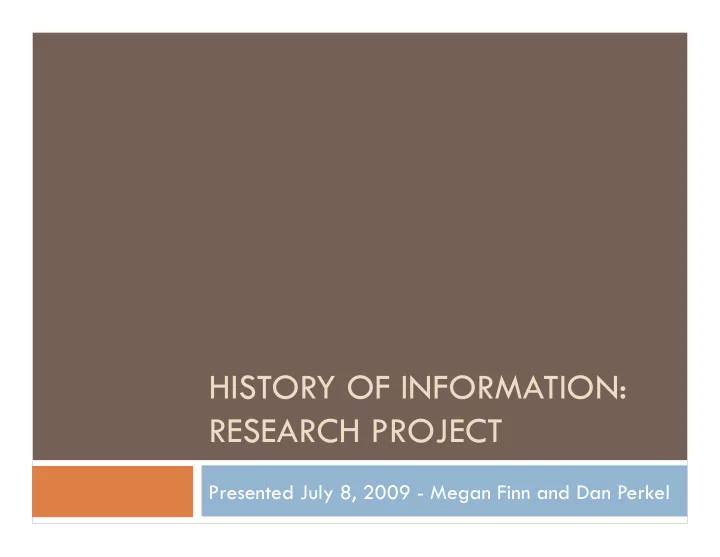

HISTORY OF INFORMATION: RESEARCH PROJECT Presented July 8, 2009 - Megan Finn and Dan Perkel
Research Project Steps 0. groups will be assigned Friday 1. Pick a topic – and write a research question 2. select sources 3. read and analyze sources (2 per person) 4. synthesize the results of your reading to answer your research question and make a compelling argument. 5. present results
Deliverables PROPOSAL: due Wednesday, July 15, 2009 LIST OF SOURCES: due Monday, July 20, 2009 PRESENTATION: You will be assigned a day: Wednesday July 29, 2009 Friday July 31, 2009 Monday August 3, 2009 Wednesday August 5, 2009 PROJECT WRITE-UP: due Wednesday, August 5, 2009
Grading Your grade on this project will be based on your presentation and your write up. We will look at the quality of your analysis, your argument’s contribution to the History of Information, and the clarity of your ideas presented orally and in your write-up.
Step 1: Topic and Research question
TOPIC and RQ - tips 1. Your project has to have a historical component 2. Pick something that you find interesting 3. Play to your groups' strengths 4. Write a compelling "how" or "why" research question 5. you must make an argument in your presentation. 6. not too narrow, and not too broad 7. Be modest.
TOPIC: select one from a list -early Spanish or Chinese Language newspapers in California - the Homebrew Computer Club in California in the 1970s -the social function of Books of Hours in Medieval Europe -modern uses of the radio by indigenous Australians
TOPIC and RQ: Another option A: Pick something that you feel is critical to understanding the history of information. B: pick a specific community, or region C: Last pick a specific time period Research questions might be: What are the institutions and technologies that shaped A for B during C?
TOPIC and RQ: your choice
Step 2: Selection of Sources
SOURCES: “Types” Primary: Gets you as close to the action as possible Secondary: Scholarly analysis of the topic at hand
SOURCES - tips 1. Patience. Invest time. 2. Pay attention to quality! 3. Two sources per group member 4. What counts as a source? Secondary source: scholarly article or book chapter Primary source: ask us
Step 3 Read and analyze sources
Critical reading Who is the author? What is their intention with this book or article? Who is the author talking to? What argument are they making? How do they make this argument? Why is this important to examining this research question? How does this work relate to other sources I am engaged with?
Step 4: Synthesis; address research questions; make an an argument
Step 4: Synthesis; address research questions; make an an argument
Step 5: Presentation; write-up
PRESENTATION: tips Explain the topic you selected State your research question Discuss your approach to addressing the RQ Make an argument Support your argument with your analysis of sources Thoughts on future work or other questions raised
Next…. before Friday: Read the research project instructions Brainstorm topic ideas for group meeting Friday: group assignments and first meeting
Recommend
More recommend